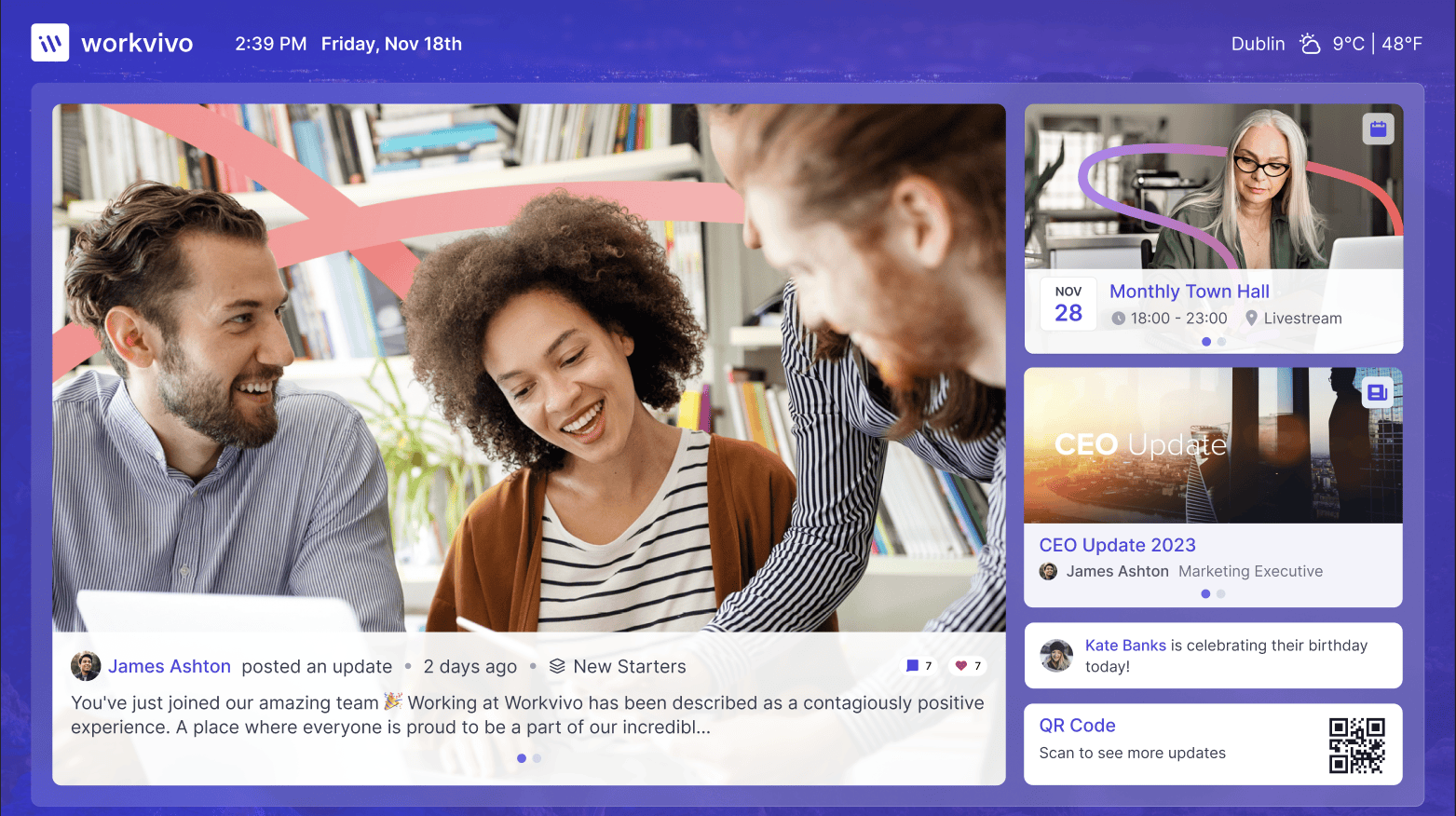7 Quick Tips To Improve Internal Comms in Healthcare

Caitlin Kirwan
External Contributor - Internal Comms & Engagement Expert
September 17 2023

Large and complex workforces, varying shift patterns, staffing issues, and inconsistent access to channels make effective internal comms in healthcare organizations anything but straightforward.
With healthcare organizations battling high employee turnover and declining engagement, improving internal communication is more important than ever.
There are numerous barriers that IC and employee experience professionals working in healthcare face when it comes to driving an engaging internal comms strategy. Communicating with geographically dispersed frontline workers has never been a walk in the park, but adding safety and wellbeing challenges, high employee turnover, and a complex mix of employees, contractors, and other suppliers can feel near impossible.
We’re here to help.
These quick tips are designed to inspire, motivate, and energize IC and employee experience professionals working in healthcare organizations.
7 quick tips for awesome internal comms in healthcare
Effective internal communication is one of the most important building blocks for an engaged and motivated workforce. And the stakes are certainly high within the healthcare industry, with research showing that a 1% increase in the engagement of hospital workers correlates with a 7% reduction in patient readmissions and a 3% reduction in hospital-acquired complications.
So, I’ve pulled together seven tips to help you improve internal communication and ultimately increase employee engagement within your healthcare organization. Let’s jump in!
1. Streamline your content calendar
Let’s be frank – healthcare workers are busy people. And busy people simply don’t have time to read a three-page weekly newsletter or watch a 20-minute video on a topic that feels irrelevant.
Plus, we already know that 43% of employees miss important information and updates due to the sheer volume of messaging they receive; this stat is more relevant than ever for healthcare employees given the non-negotiable medical information they need to process on top of organizational updates and news.
Streamline your content calendar by segmenting your audience into smaller groups. You could segment by grade, by department, or even by role. However you choose to segment your internal audience, the goal is the same – to ensure information each employee receives is truly relevant to them.
Once you’ve effectively segmented your audience, divide your content into ‘need to know’ and ‘good to know’ buckets. This will help you prioritize content and ensure the important messaging is being put first, particularly during busy periods.
Need to Know | Good to Know |
Health and safety updatesPolicy changesAmendments to regulationCritical company-wide news | Recognition storiesLeadership messagesWellbeing initiativesLong-term strategy updates |
And if a piece of content doesn’t fit into one of these buckets, you need to consider if it really needs to be published. The four steps for filtering content within our guide to tackling content overwhelm can help you out.
2. Use digital signage
When it comes to ensuring your internal messaging reaches healthcare workers, don’t underestimate the power of digital signage.
Digital signage provides an engaging and eye-catching way to connect remote workers and share important real-time updates while employees continue going about their daily work. Workvivo TV, our in-built digital signage solution, allows you to instantly broadcast updates, news, and events to the entire workforce, regardless of their location or shift pattern.

3. Consolidate your online platforms
We’re all about making lives easier and improving employee experience. And consolidating your online platforms is one of the best ways to do that.
The average large company now uses 15 to 35 different HR platforms. Clicking through platform after platform is time-consuming and frustrating for employees, not to mention that maintaining all of these different platforms is both costly and difficult to manage for IC and HR professionals.
Consolidating your online platforms by using a central hub, like Workvivo, gives your employees a 360-degree overview of everything they need to access on a daily basis. And if full-blown integration is too far out of reach, just having a centralized site with links to the other platforms is incredibly helpful.
Focusing on consolidating and integration also enables you to access all-important data and analytics in a more useful way.
4. Provide line manager communication support
Did you know that 61% of frontline workers prefer company messaging to come from their line manager, over any other communication channel? Line managers are one of the most important keys to effective internal communication, particularly in the healthcare industry.
They have the single biggest impact on team performance, and studies have even found that employees with managers who communicate well are almost three times as likely to be engaged than those with managers who do not.
Providing team leaders with standardized templates and cheat sheets can help them deliver more effective employee briefings and shift handovers. These kinds of handy resources promote consistent communication between different teams, leaders, and departments – reducing the margin for error.
For more advice on how to support line managers and team leaders, check out Workvivo’s Guide To Supporting Line Manager Communications.
5. Incorporate offline channels
As old-school as they may seem, offline channels still add a lot of value to the employee experience within healthcare settings.
Giving employees access to interactive online platforms is a really important prerequisite for effective internal communication, but adding offline touchpoints to your channel mix can be incredibly beneficial.
Consider making tabletop display stands for staff canteens and coffee areas, quarterly newspapers, or toilet door posters part of your communication strategy.
Remember to integrate your offline and online channels by sharing QR codes and directing employees to the online hub for full information.
6. Prioritize connection and community
Working to build connection by creating a sense of community across the organization is one of the most tangible ways you can help to improve the employee experience for healthcare workers.
A more connected and unified workforce collaborates more effectively, is more engaged, and has lower employee turnover.
Think about introducing book groups, sports clubs, clothes swaps, or quiz nights. Not every employee will be able to attend every event, so build a varied calendar of activities that different people can get involved with. Promote the activities through your online and offline channels, and stay focused on the objective of building social connections and creating a positive community between colleagues.
7. Enable two-way communication and employee listening
At the beginning of the year, we wrote about 7 Internal Comms Trends That Will Shape 2023. The increasing importance of ‘employee listening’ was something we predicted would be an important internal communication trend throughout 2023.
And it certainly has been.
Effective internal communication is only possible when an organization actively listens to its employees. Employees who feel they are being listened to are five times more likely to perform at their best.
And we’re not just talking about traditional employee surveys. We’re talking about conducting regular, focused listening activities, which result in more precise, more valuable insights. Launch and promote channels that enable two-way communication, and ask employees for feedback. Organize focus groups, share pulse check-in surveys, and ask team leaders for input.
All of these actions are incredibly powerful when it comes to managing an effective internal communication program within a healthcare organization. Start where you can, and build up.
Reach out for your Workvivo demo
We hope these seven tips have provided some inspiration and guidance for improving internal communication within your healthcare organization!
If you’re interested in learning more about any of the Workvivo product features we talked about in this blog, come and say hello to book a demo. We’re always up for a chat.
